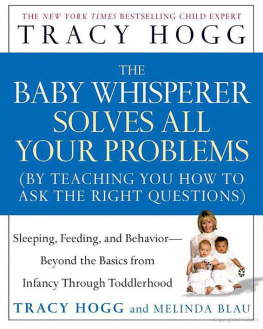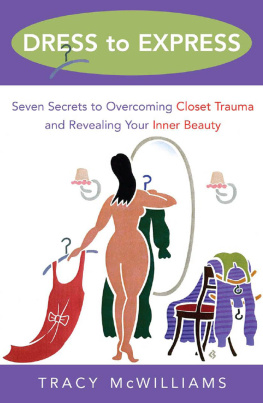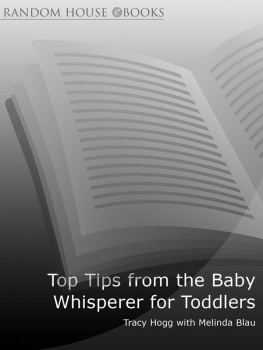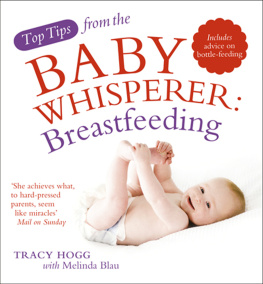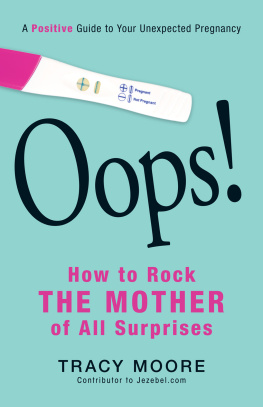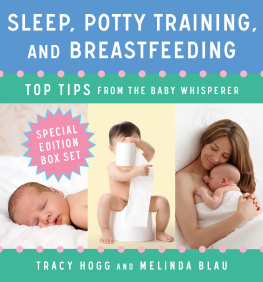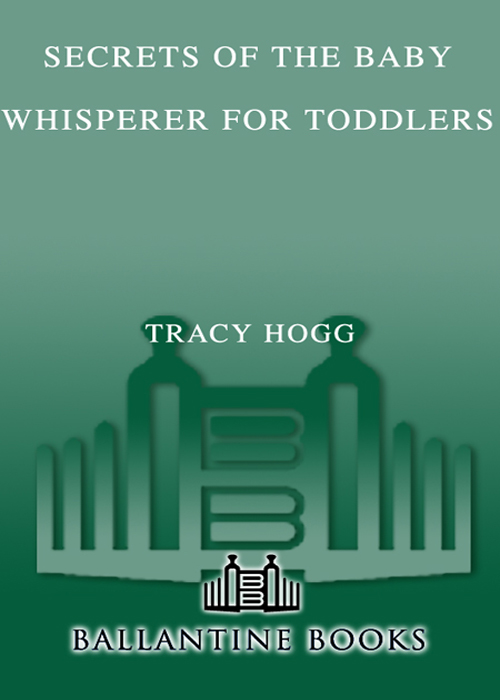
Secrets of the
Baby Whisperer
for Toddlers
Tracy Hogg
with Melinda Blau
Ballantine Books New York
Contents
Toddler Whispering
The challenge of toddlerhood and how my philosophy applies
Loving the Toddler You Have
Awareness of your childs temperament; how nature and nurture work together
H.E.L.P. to the Rescue: A Mantra for Everyday Moments
A strategy to determine when to intervene, and when to encourage independence
R&R (Routines and Rituals): Easing the Toddler Tug-of-War
The importance of a structured routine
Nappies No More: Striding toward Independence
Issues related to mobility, playing, eating, dressing, and potty
Toddler Talk: Maintaining a Dialogue through T.L.C.
Talking with your child as she moves from Banguage to language
The Real World: Helping Your Child Rehearse Life Skills
Using everyday moments at home to enhance social and emotional readiness
Conscious Discipline: Teaching Your Child Self-Control
Setting limits and helping your child manage his emotions
Time-Busters: Sleep Deprivation, Separation Difficulties, and Other Problems That Steal Hours from Your Day
Solving chronic behavior problems
When Baby Makes Four: Growing Your Family
Preparing for a second child; dealing with siblings; caring for your relationship and taking time to care for yourself
Some Final Thoughts
Introduction
Toddler Whispering
As parents, we are our childrens first and most important mentors: their guides to lifes lessons and adventures.
Sandra Burt and Linda Perlis,
Parents as Mentors
The Challenge of Toddlerhood
You know the old saying, luv: Be careful what you wish foryou just might get it. If youre like most parents, I suspect that you spent a good part of the first eight months of your babys life wishing things would get easier. Mom prayed he would get over that colicky period, sleep through the night, and start taking solid food. And if Dad is like most men, he probably wished his little man would soon become less of a blob and more like the son he dreamed of playing touch football with. You both looked forward to the day Junior would take his first step and say his first word. You happily envisioned the day hed pick up a spoon, put on a sock, and somedayplease Godgo potty by himself.
Now that your baby is a toddler, your wishes have come trueand Ill wager that some days youd just as soon turn back the clock! Welcome to what is probably the most strenuous and awe-inspiring stage of parenting.
The dictionary defines a toddler as a small child roughly between the ages of one and three. Other books mark this phase of childhood when a baby first begins to toddle, or walk with short, unsteady steps. For some, this can be as young as eight or nine months. Either way, trust me, if you have a toddler on your hands, you know it, no matter what a book tells you.
Though at first your toddler may be a tad shaky on her feet, your little darlin is now truly ready to explore people, places, and thingswithout your help, thank you very much. She is becoming social, too. She loves to imitate. She can clap, sing, dance, and play side by side with other children. In short, shes more like a miniature person now than a baby. Shes wide-eyed with curiosity, full of energy, and courts trouble constantly. The developmental leaps at this age are miraculous, but given the rapid changes and the rambunctious moments, its no wonder you feel like youre under siege. Every container, every object your toddler can grasp, every electrical outlet, every cherished knickknack is fair game. From her perspective, its all new and exciting; from your perspective, it can feel like an assault on you, your house, and everything in sight.
Toddlerhood clearly marks the end of infancy. Its also a sneak preview of adolescence. In fact, many experts think of this period in the same vein as the teenage years, because a similar separation process is under way. Mum and Dad are no longer the beginning and end of a toddlers world. In fact, as she rapidly acquires new physical, cognitive, and social skills, she also learns how to say no to youa skill that also will serve her well in adolescence.
Be assured, ducky, thats the good news. Indeed, it is through your childs exploration and struggles (often, with you), that your toddler begins to gain mastery over her environment and, most important, gains a sense of herself as a competent and independent being. Of course, you want your child to grow and to become more self-sufficient, even though at times the process is maddening. I know, because I lived through it with my own children who, after all, were my first guinea pigs (and my best students). I think I did a pretty good job with my girls, who are now nineteen and sixteen. But thats not to say that it has been smooth sailing all the way. Believe me, raising any child is a very difficult job and comes with heaps of frustration and brick walls, not to mention tears and tantrums.
Baby Whispering:
The Foundation of Good Parenting
Aside from my own experience, I have counseled countless parents of toddlersoften those whose children I first met as babiesand I can help you get through these difficult years, which I define here as roughly the period from eight months (not so coincidentally where my last book ended) to two years plus. If you read my first book, Secrets of the Baby Whisperer, you already know my philosophy about children. All the better if you adopted a structured routine from the day your baby came home and if youve been using some of my strategies. I daresay youre probably ahead of the game, because you already think in a way that will help you with your toddler.
However, I also recognize that some of you are new to my ideas, which were sparked when I first worked with children who had a range of physical and emotional impairmentschildren who often had no language skills. In my work with disabled children, I had to observe the nuances of their behavior and their body language and make sense of their seemingly unintelligible sounds in order to understand what they needed and wanted.
Later, spending my time almost exclusively with infants (including my own), I discovered that those skills worked just as well with babies. Having cared for over five thousand babies, I fine-tuned what one of my clients dubbed baby whispering. Its quite like what a horse whisperer does, but here were talking about infants. In both cases, were dealing with sensate creatures, living beings who cant actually talk but express themselves nevertheless. In order to care for and connect with them, we must learn their language. Hence, baby whispering means tuning in, observing, listening, and understanding whats happening from the childs perspective.
Even though toddlers are beginning to acquire language and express themselves better than newborns do, the same principles of baby whispering that guide my work with infants can be applied to this age group. For those of you who didnt read my first book, below I offer a quick review of its major themes. If you have already read my first book, the following will be familiar. Think of it as a refresher course.
Every child is an individual. From the day a baby is born, she has a unique personality, as well as likes and dislikes of her own. Therefore no one strategy works for all. You have to find out whats right for your toddler. In Chapter One, I provide a self-test that will enable you to gauge what kind of temperament your child has, which in turn will help you understand what parenting strategies might work best with her. But even when divided into so-called types, each child is a one-of-a-kind phenomenon.
Next page

